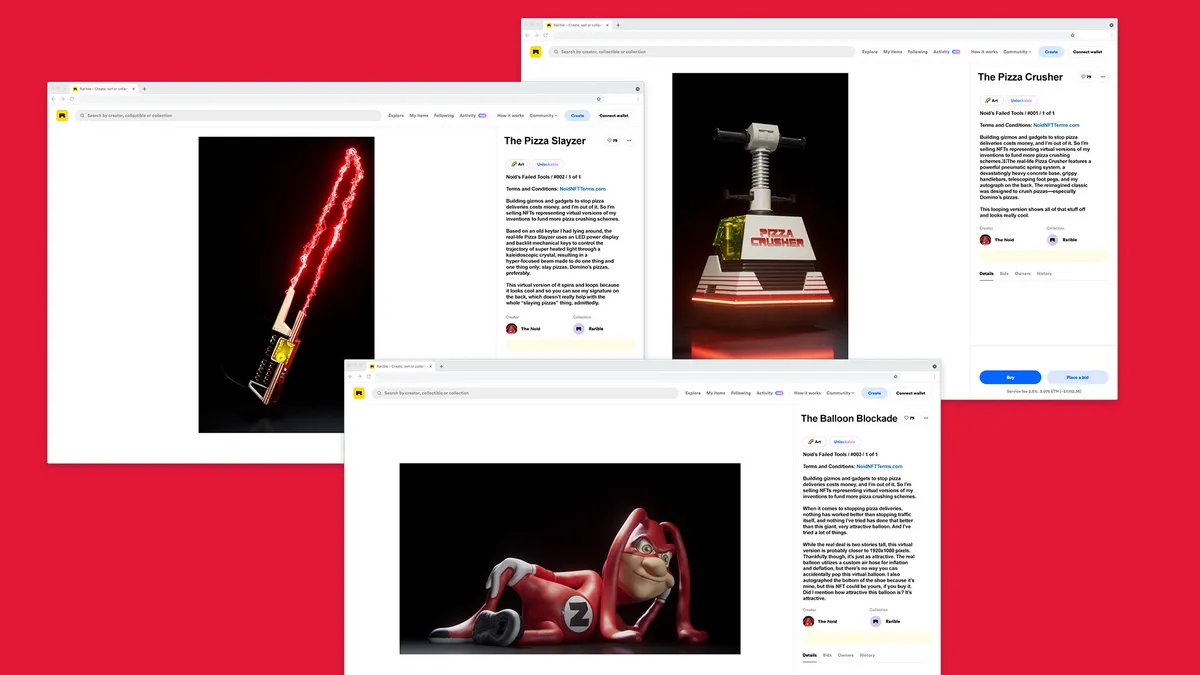While nonfungible tokens (NFTs) — unreplicable digital assets certified by blockchain technology — remain a controversial topic, agencies are nevertheless starting to look at the space as a specialized service area. Last week, Vaynermedia announced the creation of an in-house team dedicated to NFTs called VaynerNFT, with AB InBev as its first client, as reported in Ad Age. VMLY&R, Huge and Digitas are also excited about the latest crypto craze, per the report.
The complications of activating around blockchain mean agencies have the opportunity to carve out a meaningful consultative practice, according to analysts. However, marketing services providers may want to specifically approach NFTs with a higher degree of risk in mind, as recent months have seen apps and digital channels explode virtually overnight only to see their popularity dry up almost as quickly.
"There's every chance this could become the next Clubhouse," said Greg Paull, co-founder and principal at consultancy R3, of NFTs, noting that it may take another three to six months to see if the trend has real staying power.
"I do think that the concept of blockchain and protecting the actual IP of the digital creation should stick around. Whether or not it becomes something that sells $60 million pieces of art is another story," he added.
A potential influx of NFT services speaks to how the embattled agency category is in a transformative period, directing more investments to digital, data and e-commerce functions to keep pace with trends accelerated by the coronavirus pandemic, including emerging interest in the "Metaverse" — a term for the convergence of physical and digital worlds. But NFTs are no surefire bet, with intense fluctuations in value, growing concern regarding their environmental impact and big questions around whether brands are always a good fit. A mass-market packaged goods label, for example, may not wield the type of clout that will spur consumers to pay high-dollar prices for a digital asset at auction.
"It does feel like it is trying to place a value on something that is intrinsic," said Jay Pattisall, a principal analyst at Forrester. "The relationships between brands and consumers are, in fact, very intrinsic; it is about the feeling."
That means the broader NFT market could remain more prevalent in niche categories like luxury goods and among "passion brands" versus becoming the next major locus of transformation.
"This situation feels familiar to what social was in 2009-10. Every time you brought it up, the brand was excited but not really sure what to do with it," said Pattisall. "This feels like it could have a similar trajectory where it is a technology in search of a strategy."
Cutting through the hype
Getting in early on bleeding-edge tech has proved a challenge for agencies in the past, and their latecomer qualities have done few favors as consultancies like Accenture and Deloitte set up larger marketing services operations. That could be one reason agencies are willing to make the leap on NFTs despite the larger uncertainties. Client demand is also abundant following a tough period for new business, with brands ranging from Domino's Pizza to Asics recently holding NFT auctions.
"Any move that an agency can make to better consult with their clients, and be a consultative resource for their clients, is a good move, regardless of what that subject matter may be," Pattisall said. "Positioning themselves to consult across emerging technologies, may it be NFTs, blockchain or otherwise, just puts them in a better position to be agents on behalf of their clients."
Still, Vaynermedia's NFT unit, one of the most noteworthy moves into the space so far, could be a special case that other agencies may have trouble following. The head of the shop, Gary Vaynerchuk, has other NFT bets, including a collection called Veefriends that launched in May. The entrepreneur also has an outsized personal brand and wide social media reach that may have a more built-in audience for such forward-looking gambles.
"I'm sure this is the first, it won't be the last," Paull said of VaynerNFT.
"[Vaynerchuk's] got a really unique place to get his message out, so I think that's going to be a great asset to him going forward," he added. "For other agencies, they're going to think about: How do I amplify this? It's not going to be as easy as it seems."
In the long term, analysts see real value in the way blockchain-based tech like NFTs could be applied to protect creative ideas — a frustration for agencies that pitch concepts to brands, only to see them cribbed without credit further down the road — or bring more transparency to an opaque digital media supply chain. But at a moment where returning to growth in the short term is pivotal, NFTs are unlikely to be a panacea, or even a particularly impressive maneuver to agency stakeholders.
"It is not nearly as tangible as building a retail media practice," Pattisall said. "The valuations that investors or shareholders place on companies come from the tangibles that are churned out from the marketing engine — the net new customers, the growth in revenues and sales — not whether they're poised to exploit a somewhat risky nascent technology."























